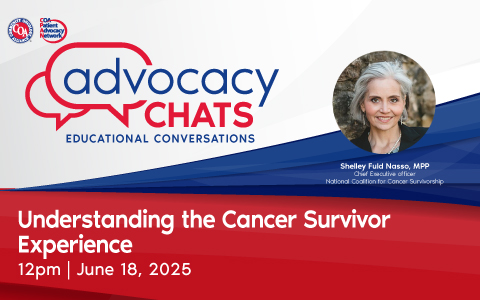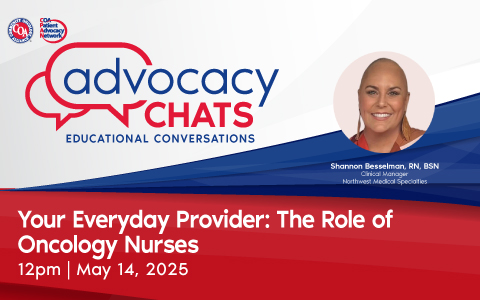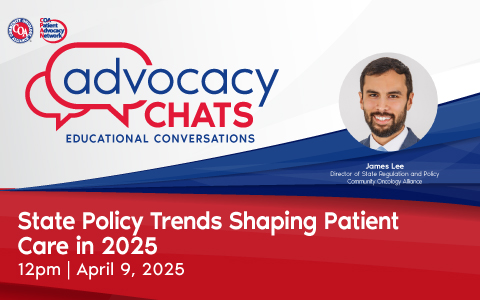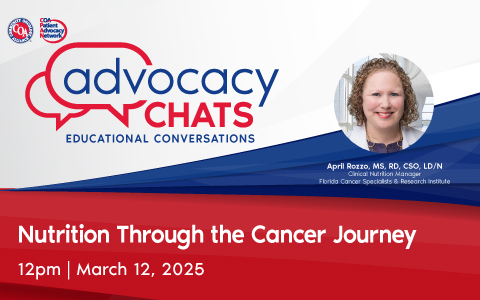Changing the Way Men Go Through Cancer
Important Reminder
The Community Oncology Alliance (COA) and the COA Patient Advocacy Network (CPAN) announce a Save the Date reminder for patients and cancer survivors:
May 8, 2024
COA Capitol Hill Day
Washington, D.C.
Patients and cancer survivors who have been or are being treated in a community oncology practice are invited to join us on Capitol Hill in Washington, D.C. Targeted states and specific criteria will be provided at a later date.
Changing the Way Men Go Through Cancer
Because colorectal cancer is the leading cause of cancer deaths and March is Colorectal Cancer Month, Rose Gerber, MS, Community Oncology Alliance’s (COA’s) director of patient advocacy and education is joined by Trevor Maxwell, founder and CEO of Man Up to Cancer, to talk about the importance of reaching men who are undergoing treatment for cancer and offering them the mental and emotional support they need during their journey.
Rose and Trevor discussed the history of Man Up to Cancer, how it is addressing male loneliness in the face of cancer, how CPAN advocates can use Man Up’s lessons to reach the men in their lives, and what can be done to support men who have been newly diagnosed with cancer. Reaching out to patients with cancer and supporting their mental health can improve treatment outcomes, improve the quality of life during treatment, and preserve relationships with friends and family.
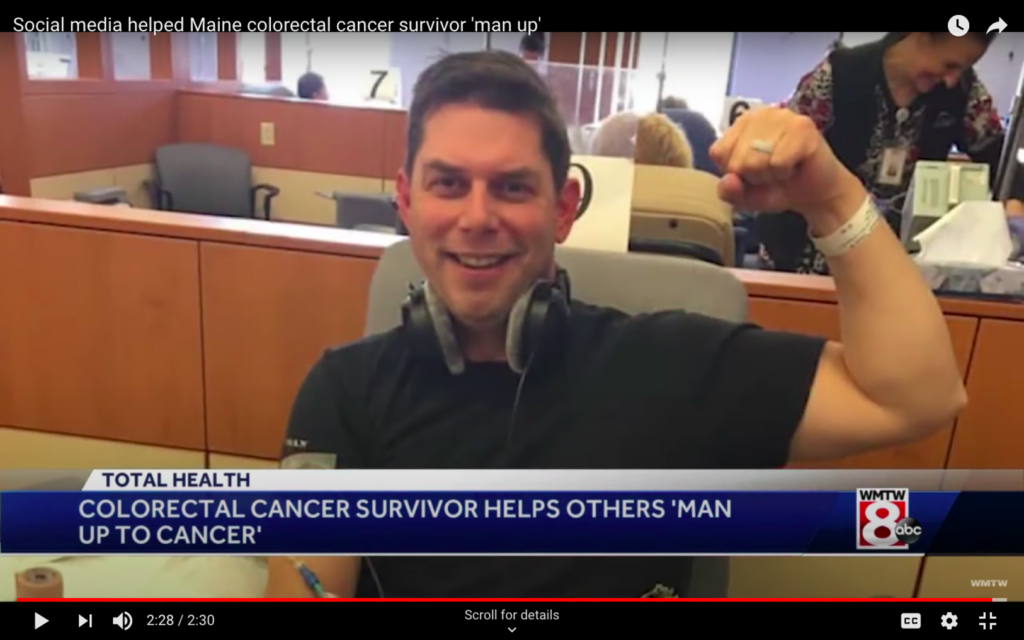
How It Began
In 2018, Trevor Maxwell was diagnosed with Stage IV colon cancer at the age of 42. The diagnosis quickly took a toll on his mental health, causing him to become depressed before he sought out group support programs. As he met with other patients, he quickly realized that men were underrepresented at these groups because they were trying to go it alone. In response, Trevor created Man Up to Cancer to bring men out of their isolation and provide a space where they felt supported. As of 2024, Man Up to Cancer has become an international organization, reaching men to let them know they are not alone during their cancer journey.
Trevor was young, healthy, and active when all of this came upon him. Turning to his journalism background, he discovered the overall survival rate for Stage IV colon cancer is less than 15 percent. That left him in a place where he felt broken and hopeless. When he hit what he calls “rock bottom,” his support of family and friends carried him. As he began reaching out, he found additional support in several areas and felt less alone.
How It Is
As of 2024, Trevor has had 50 rounds of chemo and seven surgeries. He had had metastases, or “mets,” in his lungs, liver, and his abdomen. Today, he has beaten back all the mets except those in his abdomen and has been in almost continual treatment. Emotionally and mentally, he is back. All of this was the origin and genesis of starting Man Up to Cancer.
There are unrealistic expectations placed upon patients and survivors to be models of strength and positivity. By acknowledging that a cancer diagnosis commonly changes people, though most do not say that aloud, he came to terms with the mental and emotional impact of his cancer diagnosis. Eventually, he was able to recognize and accept that something as profound as a Stage IV diagnosis at a young age has mental side effects that can often be almost as profound as the physical effects.
Showing It All
Patients with cancer often feel extreme grief and fear, but feel that they cannot share, and therefore cannot process those feelings because they often believe no one wants to hear those things. Trevor remembers lying on the floor of his daughters’ bedroom, worried that they would only remember him as sick. He fully attributes his wife as his primary support in battling cancer, and she was the one who told him she worried that they would only remember him as sad. He started to see that he needed to fight for his emotional and mental health as much as he fought for his physical health.
Normalizing the Cancer Experience
Part of the goal of Man Up to Cancer is going beyond putting on a happy face because that is what might be expected. Not only is it okay to share it all, but it is also healthy to share it all. It is healthy to experience all those emotions that come with cancer. Patients often get down on themselves for feeling negative, for having dark thoughts, and even just for the way they think. That is not helpful and not healthy.
Colorectal Cancer – On the Decline and the Rise
Colorectal cancer is stable or on the decline among older adults – 50 and older – largely due to the increase in the screening rate. Unfortunately, colorectal cancer is disturbingly on the rise for people under 50. The rate is rising by multiple percentage points every year. As a result, it has become the leading cause of cancer death for men under 50 and the second leading cause of cancer death for women under 50.
Discussing colon cancer is an uncomfortable conversation, but these statistics should both alarm and shock. Perhaps the most alarming thing about colorectal cancer for those under 50 is we don’t know why the numbers are on such a rapid rise.
There are theories. The scientific community suggests it may be environmental exposure or diet. Other groups suggest other factors, but there is no scientific evidence to explain the increase. While money has been directed towards awareness and treatment, there is remarkably little effort to answer the question of why there is such an increase.
It’s about Awareness
It is more and more common for otherwise healthy people in their twenties, thirties, and forties to present to their primary care physician symptoms that are often ignored. It is often only when they are back six months later with worsening symptoms and finally get a colonoscopy that a diagnosis of late-stage colon cancer is revealed. Statistics make the suspicion of colorectal cancer a more obvious consideration. That colorectal cancer is not an even earlier thought is an issue of awareness. The thought “I am 37; I can’t have colon cancer,” is passé thinking.
What Was the Available Support?
The first step for many men is getting over the “guy” barrier of accepting help. One fact became glaringly clear about counseling and groups, both in-person and online – those leading the groups were female and those accessing support were overwhelmingly female, often as high as 75 percent of the group members.
It seemed one of two things might be true. Initially, Trevor thought he was just weak, and most men coping with cancer had things figured out and did not need the help he did. The other option was that many men were struggling just as he was, but they had been taught not to seek help because it was a weakness, unmanly, and thought they had to cope on their own. It turned out it was not that men didn’t need help but rather that they were not comfortable accessing what was currently available.
He decided to build a community for men by men. He soon discovered many men do not want to share the intimate details of their cancer in a co-ed space. For many men, sharing those thoughts was emasculating. Despite how men have or should have evolved, this remains true even in 2024.
Concurrently he dug into the science behind isolation discovering that men are isolating more than women when dealing with cancer. Research has shown that when people isolate when going through cancer they have:
- More mental health problems, such as depression, anxiety, substance abuse
- Greater frequency of broken relationships
- Worse medical outcomes
Man Up to Cancer is not just about getting together, talking, and hanging out. There is a practical guidance behind coming together. The “this is practical” appealed to the men, many of whom are practically minded. With that information, they embraced avoiding isolation.
The Man Up to Cancer 2500 member Facebook group has a higher level of engagement than 95 percent of the groups on Facebook. When someone mentions that he is having a scan next week and is nervous, 20-25 responses are common. Man Up to Cancer has proven that given the right environment men want to and will open up. The group has grown organically through word of mouth.
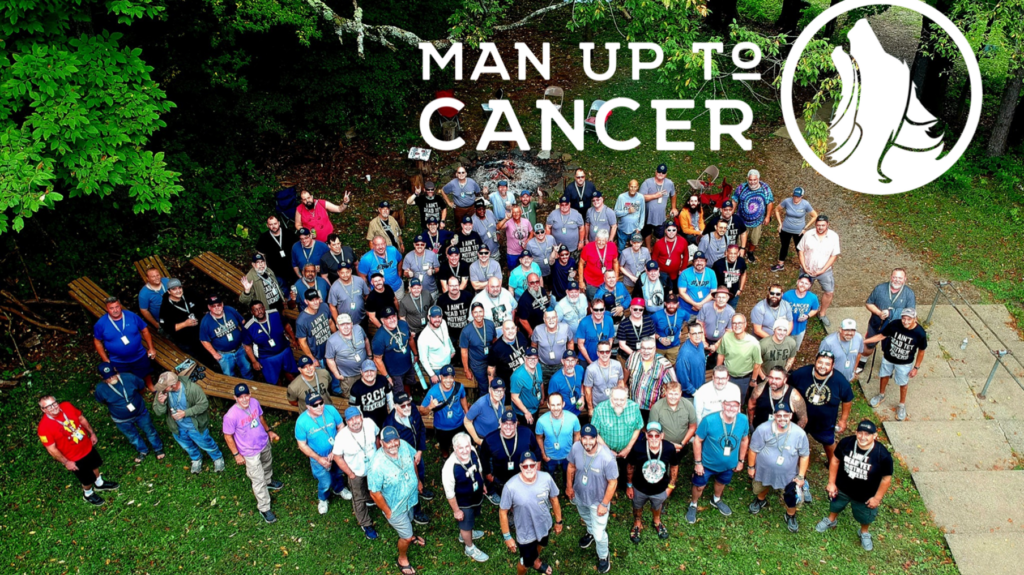
Who is Part of Man Up to Cancer?
The 2500 members primarily in the United States and Canada are patients, survivors, and a few male caregivers. Members range in age from 18 to 80 years old. The organization also has relationships with community oncology practices and some National Cancer Institute (NCI) centers. Within the group, 50+ types of cancer are represented.
Man Up to Cancer offers four main programs:
- Gathering of Wolves, an in-person men’s cancer retreat
- Chemo Care Backpack Program that distributes supplies and materials to men going through chemotherapy or surgery
- Over 40 local chapters that allow members to gather locally for a ballgame, movies, or dinner enabling the invaluable benefit of in-person support
- Bi-weekly organization-wide Zoom meetings, as well as local chapter Zoom meetings
Man Up to Cancer is comprised of a very committed group of men willing to ask for support, as well as give it. They pride themselves on extending brotherly love to each other and normalizing its importance.
Summary
Advocacy Chats are regular virtual 30-minute educational conversations about cancer advocacy and policy with a guest speaker invited to discuss issues important to patients and advocates. Summaries of previous Advocacy Chats are available on the CPAN website.
CPAN Advocacy Chats are regular virtual 30-minute educational conversations about cancer advocacy and policy with a guest speaker invited to discuss issues important to patients and advocates. Summaries of previous Advocacy Chats are available on the CPAN website.
Past Advocacy Chats

